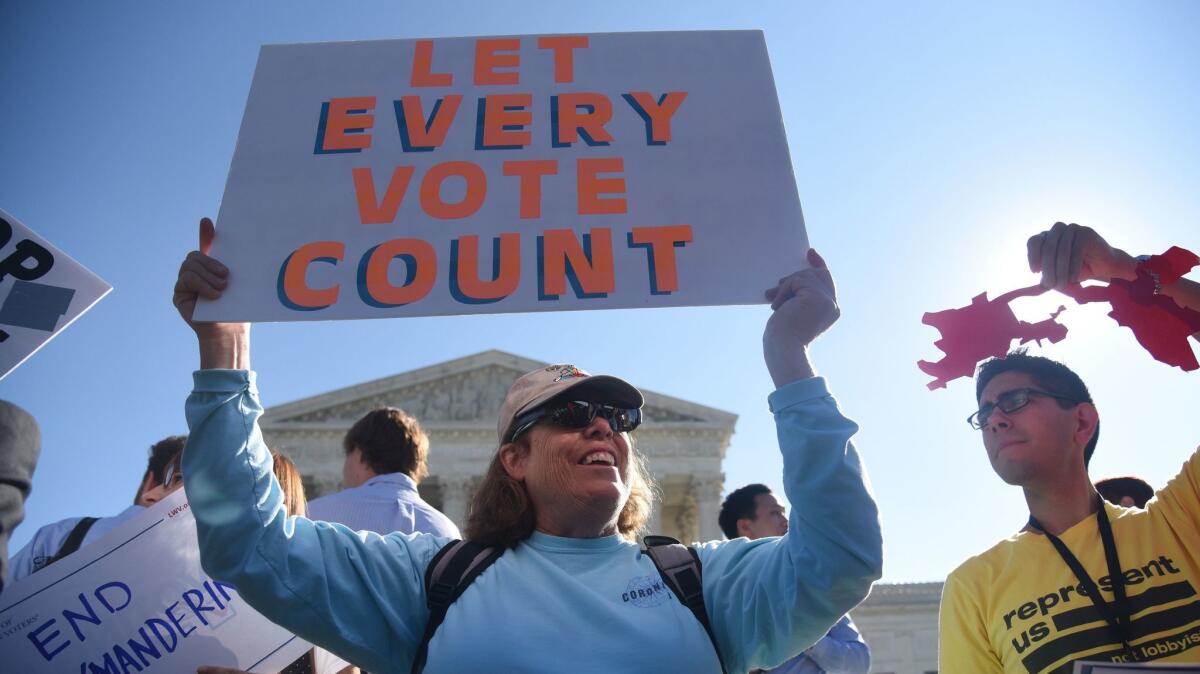Op-Ed: What’s the best way to fix our broken democracy? Lean on state courts and constitutions

State constitutions are powerful documents. They tend to protect individual rights — including the fundamental right to vote — more broadly than the U.S. Constitution. And this fact may well help to fix our broken democracy.
The disparity between our state and federal controlling documents became obvious on Monday when the Pennsylvania Supreme Court struck down its legislature’s congressional redistricting map, which heavily favored Republicans. The court wrote that the map “clearly, plainly and palpably violates” the state constitution. By contrast, a federal court ruling earlier this month rejected the plaintiffs’ challenge to the same map under the U.S. Constitution.
Although the Pennsylvania Supreme Court did not give its precise reasoning — it said that a fuller opinion would follow — presumably its judgment will rest in part on two important provisions of the state constitution: that all citizens in the state “shall be entitled to vote at all elections” and that elections in the state must be “free and equal; and no power, civil or military, shall at any time interfere to prevent the free exercise of the right of suffrage.”
These clauses mean that the Pennsylvania Constitution explicitly protects the right to vote.
The U.S. Constitution is less specific. It instead says that states cannot discriminate in voting based on various characteristics such as race, sex, age or inability to pay a poll tax. And the U.S. Supreme Court has ruled that states must confer voting rights on an equal basis under the 14th Amendment’s Equal Protection Clause. But nowhere does the U.S. Constitution affirmatively grant the right to vote.
This silence is one reason why the U.S. Supreme Court has found it so hard to police partisan gerrymandering. Without explicit protection of voting rights within the U.S. Constitution, the court has struggled to find a proper test for judges to use to invalidate a map. Generally speaking, the court often defers to states in how they regulate their election processes.
There’s a meaningful way to challenge the worst abuses in partisan electoral gamesmanship.
The court is hearing two cases this term, one from Wisconsin and the other from Maryland, that ask it to strike down extreme partisan gerrymandering under the Equal Protection Clause or the 1st Amendment. As is often the case, Justice Anthony M. Kennedy will likely be the swing vote, so the outcome is uncertain. Regardless of what happens at the U.S. Supreme Court, however, state courts can follow Pennsylvania’s lead in letting state constitutions guide their decisions.
Unfortunately, some state courts have analyzed their constitutions to go in lockstep with the federal version, construing these documents to provide the same, relatively weak voting protections as the U.S. Constitution. That’s wrong for a number of reasons: All 50 state constitutions explicitly protect the right to vote; the U.S. Constitution actually points to state authority in dictating who may vote in congressional elections; and, as the most important right in our democracy, the right to vote should enjoy the broadest possible force. Why not let federalism thrive?
Indeed, the Pennsylvania Supreme Court noted that it had struck down the redistricting map on the “sole basis” of the state constitution. This language presumably was meant to indicate that it saw no issues under the U.S. Constitution or federal law, thereby preventing the U.S. Supreme Court from having jurisdiction to review the decision. Although Pennsylvania Republicans will seek review at the U.S. Supreme Court, most observers think that’s a long shot. The Pennsylvania court will likely have the final say.
Even as the U.S. Supreme Court continues its conservative streak, state constitutions and state courts provide a path for reformers to challenge onerous laws involving partisan gerrymandering or other voting issues, such as voter ID laws. In fact, in recent years several state courts have struck down voter ID laws under their state constitutions, championing the importance of the right to vote. Others, however, when ruling that the state constitution provides merely the same narrow protection as the U.S. Constitution, have upheld these restrictions.
Voting rights advocates across the country are celebrating the Pennsylvania case because of the message it sends: There’s a meaningful way to challenge the worst abuses in partisan electoral gamesmanship. It just takes a state court willing to take its state constitution seriously.
Joshua A. Douglas is a law professor at the University of Kentucky College of Law. He is the co-editor of “Election Law Stories” and is writing a book on positive voting rights expansions. Twitter: @JoshuaADouglas.
Follow the Opinion section on Twitter @latimesopinion or Facebook
More to Read
A cure for the common opinion
Get thought-provoking perspectives with our weekly newsletter.
You may occasionally receive promotional content from the Los Angeles Times.










